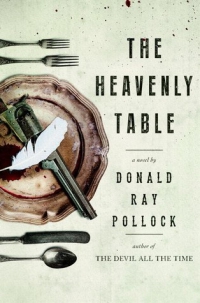
Published by Doubleday on July 12, 2016
Readers who are familiar with Donald Ray Pollock expect his characters to be defined by a combination of hardship, violence, and ignorance, softened by occasional moments of compassion and wisdom. In The Heavenly Table, Pollock focuses on impoverished characters in the World War I era who are struggling with life’s unfairness as they search for self-worth or redemption or something that will give purpose to their lives.
Pearl Jewett has three sons: Cob, Cane, and Chimney, all named in fits of drunkenness. He loses his farm in a futile effort to keep his wife alive and confronts a crisis of faith as he struggles to feed his children. He tells them that good fortune awaits -- they will all dine at the heavenly table when they go to meet their maker. Their more immediate fortune is uncertain as they try to make their way in the world, guided by a pulp western that chronicles the adventures of an outlaw named Bloody Bill.
Other characters play out their own dramas as the Jewetts emulate Bloody Bill. Vincent Bovard, in despair after his fiancé leaves him, decides to join the Army and die on the Western Front. Serving as a lieutenant in Ohio who is still far from the front, he struggles with his sexual identity.
Ellsworth Fiddler, a farmer, has been swindled out of his life’s savings. Jasper Cone inspects outhouses in a town where indoor plumbing is considered a Socialist threat. Sugar Milford is a black man who can’t get ahead in a white world -- although his idea of progress is to find a new woman who will support him.
Pollock stretches his literary legs in The Heavenly Table without departing from this strength -- the ability to make readers understand, and relate to, the troubles of people who are disadvantaged by a lack of education, opportunity, and positive parental role models. Many of the characters are desperate -- for money, for friendship, for a woman’s touch, for a peaceful existence. There is greater depth in Pollock’s characters than in his past work, no small feat for a writer whose characters have always been strong.
Pollock uses chance and geography to tie the story threads together. Although The Heavenly Table story is not entirely bleak, Pollock doesn’t contrive the kind of happy endings that appeal to lovers of cozy mysteries, On the other hand, readers who like gritty stories about desperate characters will find much to admire in The Heavenly Table. Pollock's prose, his plot, and his characters are all exceptional.
RECOMMENDED